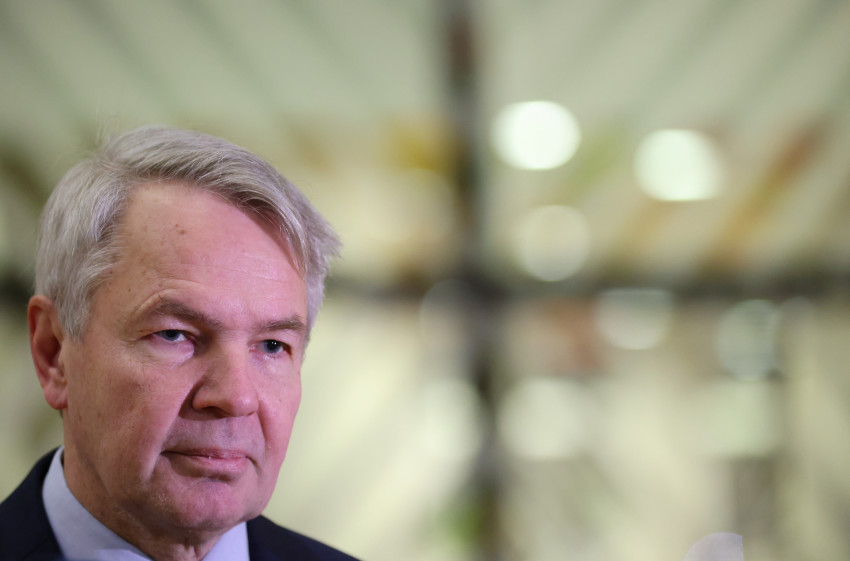Finland says time-out needed in talks with Turkey over NATO bid

Finland's foreign minister said on Tuesday that a pause of a few weeks was needed in Finland and Sweden's talks with Turkey on their application to join the NATO military alliance.
Turkey's president said on Monday that Sweden should not expect his country's support after a protest near the Turkish Embassy in Stockholm at the weekend, which included the burning of a copy of the Koran.Read More : NATO allies U.S., Turkey try to mend fences but rifts persist "A time-out is needed before we return to the three-way talks and see where we are when the dust has settled after the current situation, so no conclusions should be drawn yet," Foreign Minister Pekka Haavisto told Reuters in a telephone interview. "I think there will be a break for a couple of weeks."
Sweden's prime minister called for calm and restraint after the weekend's protests and said he hoped to restore dialogue with NATO member Turkey as quickly as possible.
"No other national security question is more important than that we, together with Finland, quickly become members of NATO," Prime Minister Ulf Kristersson told reporters.
Kristersson said there was no contradiction between upholding the right to freedom of speech in Sweden and going forward with the process of joining NATO.
Sweden and Finland applied last year to join the North Atlantic Treaty Organization after Russia invaded of Ukraine, and now need the backing of all current NATO states to advance their application.
But the Swedish government is in a bind.
Turkey has reacted strongly to protests in Sweden, which included the hanging of an effigy of President Tayyip Erdogan from a lamppost earlier this month. Prosecutors took no action over the incident, while this weekend's protests had received permission from the police to go ahead.
Ankara has also criticised Sweden over failing to extradite individuals it says are militants from the banned Kurdistan Workers Party (PKK) and a group it blames for a 2016 coup attempt.
The government says it is following domestic and European law regarding extraditions.
Initially hoping for swift approval last year, Haavisto now believes Ankara is unlikely to decide on whether to accept the Finnish and Swedish applications until after the Turkish elections due in mid-May.
The next window of opportunity for membership approval is thus likely to be between then and a NATO summit in Vilnius on July 11-12, Haavisto told a news conference.
Turkey has said that Sweden in particular must take a clearer stance against what Ankara sees as terrorists.
Erdogan on Monday announced that presidential and parliamentary elections would be brought forward a month to May 14.
Haavisto said he had spoken on Monday with Turkish Foreign Minister Mevlut Cavusoglu.
"Of course they feel the pressure from the upcoming elections in mid-May and because of that the discussion understandably has become heated in many ways in Turkey," Haavisto said.
Haavisto earlier told the broadcaster Yle that Finland should "assess the situation" if Sweden were to be permanently blocked from NATO entry, while adding it was too early to decide what this might mean.
Finland and Sweden have said they plan to join the alliance simultaneously and Haavisto told Reuters he saw no reason to consider whether Finland might go ahead alone.
Turkey's president said on Monday that Sweden should not expect his country's support after a protest near the Turkish Embassy in Stockholm at the weekend, which included the burning of a copy of the Koran.
Sweden's prime minister called for calm and restraint after the weekend's protests and said he hoped to restore dialogue with NATO member Turkey as quickly as possible.
"No other national security question is more important than that we, together with Finland, quickly become members of NATO," Prime Minister Ulf Kristersson told reporters.
Kristersson said there was no contradiction between upholding the right to freedom of speech in Sweden and going forward with the process of joining NATO.
Sweden and Finland applied last year to join the North Atlantic Treaty Organization after Russia invaded of Ukraine, and now need the backing of all current NATO states to advance their application.
But the Swedish government is in a bind.
Turkey has reacted strongly to protests in Sweden, which included the hanging of an effigy of President Tayyip Erdogan from a lamppost earlier this month. Prosecutors took no action over the incident, while this weekend's protests had received permission from the police to go ahead.
Ankara has also criticised Sweden over failing to extradite individuals it says are militants from the banned Kurdistan Workers Party (PKK) and a group it blames for a 2016 coup attempt.
The government says it is following domestic and European law regarding extraditions.
Initially hoping for swift approval last year, Haavisto now believes Ankara is unlikely to decide on whether to accept the Finnish and Swedish applications until after the Turkish elections due in mid-May.
The next window of opportunity for membership approval is thus likely to be between then and a NATO summit in Vilnius on July 11-12, Haavisto told a news conference.
Turkey has said that Sweden in particular must take a clearer stance against what Ankara sees as terrorists.
Erdogan on Monday announced that presidential and parliamentary elections would be brought forward a month to May 14.
Haavisto said he had spoken on Monday with Turkish Foreign Minister Mevlut Cavusoglu.
"Of course they feel the pressure from the upcoming elections in mid-May and because of that the discussion understandably has become heated in many ways in Turkey," Haavisto said.
Haavisto earlier told the broadcaster Yle that Finland should "assess the situation" if Sweden were to be permanently blocked from NATO entry, while adding it was too early to decide what this might mean.
Finland and Sweden have said they plan to join the alliance simultaneously and Haavisto told Reuters he saw no reason to consider whether Finland might go ahead alone.
Source: japantoday.com
